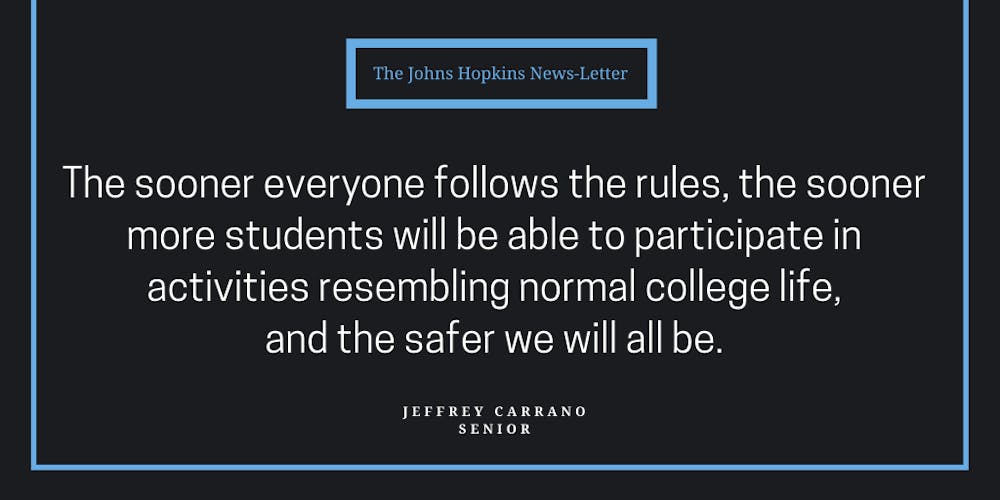It has now been over a month since Hopkins students received an email from the administration regarding a sudden spike in confirmed COVID-19 cases on campus. In the following days, several dozen students fell ill with COVID-19, and all in-person activities were banned. That ban was lifted, but ever since the events of early February, all Hopkins students have been subject to harsher restrictions on their in-person activities, including a five-person cap on indoor gatherings of any kind. Only this week has Hopkins allowed outdoor gatherings of more than five people to resume.
However, some students are granted exceptions to these rules. The Hopkins lacrosse teams, for example, have been able to begin their season in a modified in-person setting. Lacrosse games are already being played, and football practices are due to resume in-person as well. Other varsity teams have made plans to begin practicing in-person and continue pursuing their passions.
This is not to say that all student athletes are able to act just like they would any other semester. Club sports, for example, have not had in-person practices for almost a year. But the Hopkins administration has decided that allowing in-person activities for some student athletics is worth the increased risk of transmission. As long as everyone follows the rules, more students are able to participate in activities resembling normal college life.
Unfortunately, when students in an organization break the rules, we all suffer. On the weekend of Jan. 29, a group of students residing in the former Alpha Delta Phi (WAWA) house chose to hold a large party, fully aware of the high-risk nature of their activity. The results were disastrous, and the consequences of their actions are still affecting us to this day. And while a small number of those who attended were suspended (and three students were expelled), many present at the party faced relatively minor consequences, if any.
In last month’s incident, several of the students who broke the rules were members of the same student organization. Many of the same students who attended the party at WAWA were student athletes who are due to resume in-person practices this month. If practices begin, those students will be able to play their sport while every other Hopkins student must still abide by the restrictions imposed on us by their actions. The response by Hopkins appears to have been limited to addressing this issue solely on an individual basis, rather than on an organizational basis.
This sets a dangerous precedent. If a substantial number of individuals are able to break the rules and (mostly) get away with it, other students may begin to question why they even bother to follow the rules. The cycle will continue, and both Hopkins affiliates and the greater Baltimore community will be at a higher risk. And if most members of a group make the active decision to break the rules, this might suggest a larger issue within the organization itself.
The administration chose to hold “Critical COVID Conversation” sessions with registered student organization leaders and other students in the wake of last month’s spike in cases, but they never announced any action directly aimed at the very student organizations who were behind the rise in cases. This is concerning because it is the social environment of these student organizations that sways the actions of their members and enabled such dangerous behavior.
Restorative action by the administration, such as increased financial and operational support for alternatives to in-person events, could help support those organizations who want their group members to make safe decisions. Additionally, more punitive actions by Hopkins could place a greater motivation on all group members to speak up and enforce COVID-19 regulations.
In a pandemic, inaction is the same as complicity. After all, it was the failure of these student organizations to allow these events to occur in the first place.
Some students at Hopkins have the unique privilege of being able to participate in the activities they love in person. Not all Hopkins students and not all student organizations possess this privilege. So when a disproportionate number of students from the very organizations with these opportunities break the rules and endanger the health of our community the opportunities should be questioned.
With more privileges comes a greater responsibility to abide by the rules. Every student sets an example not only for their organization, but for the entire Hopkins community. The same applies for all student organizations due to resume in-person activities in the near future. Those who are managing their privileges and responsibilities properly deserve our respect. But when those responsibilities are neglected, we must reconsider the privileges these organizations have.
When students break the rules and still enjoy in-person privileges, it is visible to the students that follow the rules and cannot pursue their interests. The administration’s “Critical COVID Conversation” meetings with student organization leaders began an important discussion about the role every group plays in protecting the Homewood Campus, Peabody and Baltimore. But let’s not forget the unique allowances some student organizations have on campus.
Organizations with these privileges must step up and fulfill the responsibility they have during this pandemic. The sooner everyone follows the rules, the sooner more students will be able to participate in activities resembling normal college life and the safer we will all be.
Jeffrey Carrano is a senior from Little Silver, N.J. majoring in History and Medicine, Science and the Humanities.





